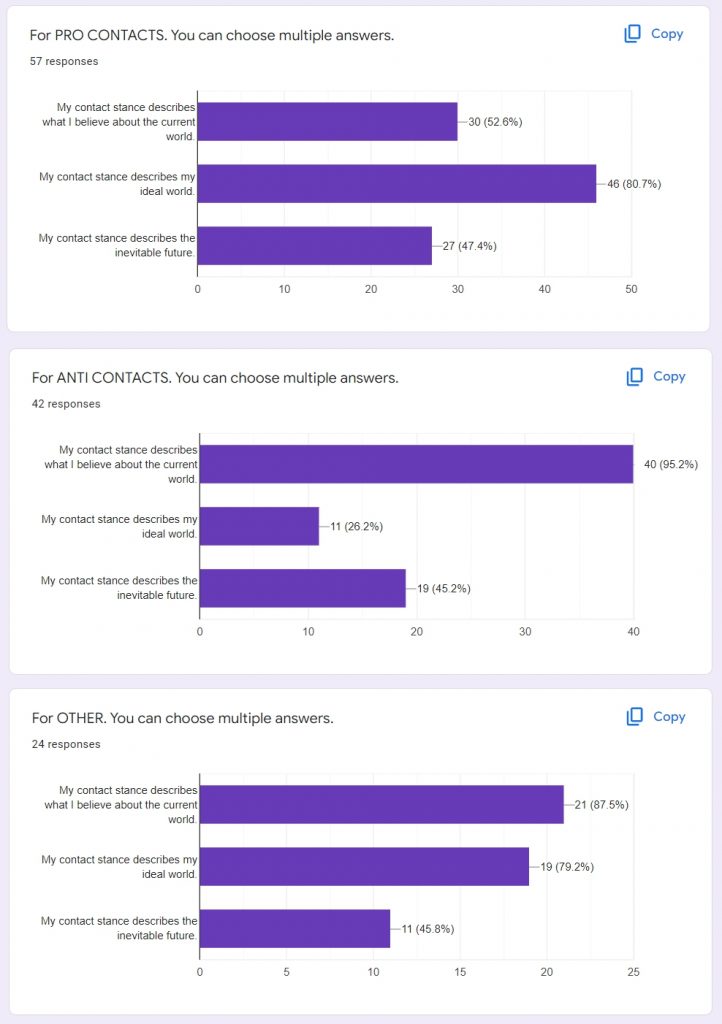Contact discourse is, perhaps, the most widespread and recurrent topic to argue about in most map spaces that have a comparable amount of members with different stances. Other political disagreements between maps sometimes end up hidden behind it, and people ignore that two anti contact or two pro contact maps can have completely incompatible reasons in defense of their positions.
Here I want to talk about how making the choice whether to reject contemporary norms or to try to fit in with them can trigger radical polarization of how you view minor attraction and create a hidden axis in addition to your contact stance.
One of the main messages the society sends us is “the majority is good, being healthy is good, these things are normal, being abnormal is bad”. Maps here are placed in the position of social outcasts, considered diseased, abnormal, in need of being fixed. At some point almost every map makes a choice – which parts of this message need to be rejected and which parts need to be kept as true. A few maps internalize the goodness of norm and the badness of minor attraction in its entirety, they become self-hating and isolated, and don’t have much influence in map inner politics. But maps who accept the message in part form two major and outspoken groups.
The medicalization model
Some maps disagree that being a map makes them bad, but agree that it’s some kind of an undesirable abnormality that nobody would consciously choose, and that the only possible course of action for the map community is close collaboration with doctors, trust in laws and the authority, and following guidelines set by non-maps. These people believe the society is more or less good enough the way it is, just needs to become more tolerant of maps as these unfortunate souls who did not choose to be this way. Most of these people are anti contact.
The tradition model
Some maps end up fully believing that the norm is good and being abnormal makes you ill and bad, but they place minor attraction in the “normal” category. They often use child brides, pederasty among ancient Greeks, and other examples of youth age gap sex to paint the contemporary Western world as the abnormality. They blame sex negativity, or, as they call it, “erotophobia”, as well as feminism, social justice politics, for corrupting the West. A common talking point is that most people are actually secretly minor attracted. According to these people, the society needs to be brought back to the “good old days”. These people are overwhelmingly pro contact.
It’s important to say that these are not the only possible views about mapness that a map may hold. Many also manage to reject the norm entirely – like myself. This would include both putting maps in charge of their own lives (without needing to justify your existence through doctors) and refusing to seek acceptance on expense of maps with lower age of attraction and other stigmatized minorities. People with this point of view are equally likely to be pro contact or anti contact and give much more varied and nuanced explanations for their contact stance than “my attraction is (ab)normal”. Yet very often pro contacts will accuse anti contacts as a whole of being pro police/pro prison, and anti contacts will accuse pro contacts of being right wing traditionalists who want a child bride. These ideas are treated as almost inherent to these contact stances, or even caused by them.
Choosing your contact discourse stance is a complex process. Polls results from about a year ago that I was seeking to include in some post and never had the occasion before show that most anti contacts identify with their contact stance because it describes what they think about the current world, while most pro contacts think about the ideal world.

This could have been essentially the same position – it’s just seen from two completely different angles. People may pick their contact stance for all kinds of reasons. And sometimes they choose a contact stance not because they particularly like this stance, but because it is opposed to the stance they dislike.
The low effort path to being anti contact is assuming the society is correct about children. The pro contact counterpart depends on believing sex cannot possibly harm children because it’s healthy and natural. Some look at this and choose the stance opposite to what they find more annoying. Then they proceed to attack these annoying things, often accusing the entire rival stance of perpetrating them.
Seeing all wrongs of the world in your political opponent or choosing a political label through reasons, not directly related to this label, is not unique to the map community or contact discourse. But pinning all disagreements and inner community problems on your contact discourse opponents is counterproductive. You have people on your side who believe in things no less regressive and bigoted. If you want a less aggressive environment in the community, you need to focus on removing the pro norm rhetoric from your corner too.
Leave a Reply